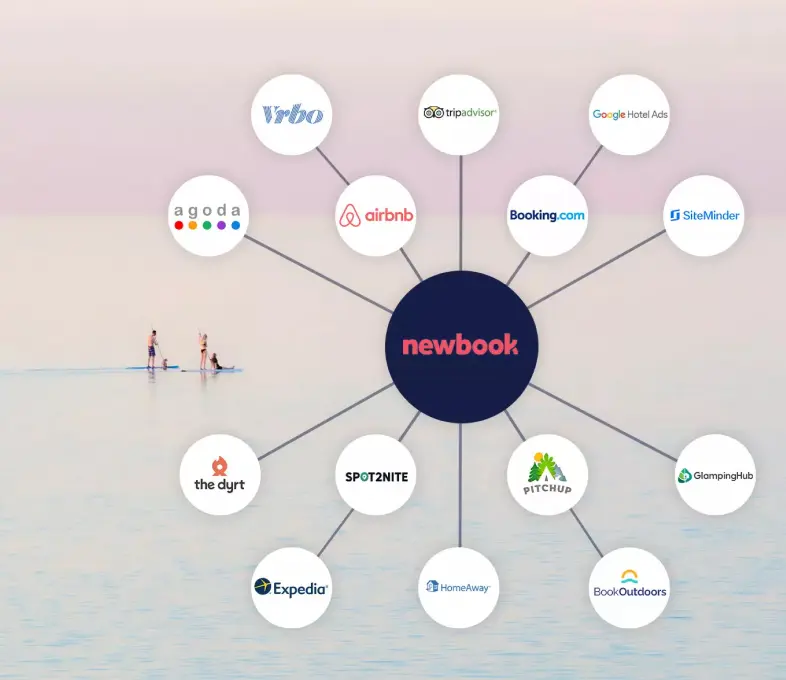You’ve finally decided to put into action your dream of owning and managing your own campground—congratulations! It is worthwhile to give people a space to enjoy a slice of nature, or even just park their RV for the night.
But to be a successful campground operator, you need to make planning a regular part of your routine. How much land do you need for your campground? What if you want to know how to start an RV campground? What infrastructure do you need (for hookups, for example), and how can you get it installed? What about staffing and maintenance?
The moving parts involved in how to start a campground may seem daunting at first, but with a bit of research, you can nail down what you need to do relatively easily. From there, it’s about following each priority in your list one by one, and soon, you’ll be ready to open.
This article provides the 101 on starting a campground, including land, finances, potential challenges, and campground software you should invest in.
eBook: Meet Your Campers of the Future
Showcasing the top 3 grow profiles to target and sharing insights on how to attract these keen campers regardless of budget or location.


What You Need to Know Before You Start Your Own Campground
Starting your own campground can be an exciting venture that allows you to blend your love for the outdoors with entrepreneurship. However, there are several crucial factors you need to consider before diving headfirst into this business. From selecting the right location to understanding regulatory requirements, this guide will equip you with the essential knowledge needed to launch a successful campground.
How Much Land Do You Need to Start a Campground
The amount of land you’ll need for your campground largely depends on the type of camping experience you wish to provide. First, you’ll need to determine what type of campground you want to offer to potential guests.
| Types of Campgrounds | Description/Recommended Land Size |
|---|---|
| Primitive Campground | These sites typically cater to tent campers seeking a more natural setting. Land requirements can vary, but for a small primitive campground, 5 to 10 acres can be sufficient to accommodate basic facilities like fire pits and restrooms. |
| KOA-Style Campground | A KOA (Kampgrounds of America) might feature cabins, tent sites, and RV hookups. For such campgrounds, 10 to 20 acres is often ideal. More acreage allows for additional amenities like swimming pools, playgrounds, and common areas. |
| RV Campground | If you’re targeting RV owners, you’ll need more space to accommodate larger vehicles and provide essential services (e.g., water, and electricity). A minimum of 20 to 40 acres is typically recommended for a well-functioning RV campground, depending on your desired capacity. |
How Much Does It Cost to Start a Campground
Starting a campground involves several one-time and ongoing expenses:
- Land Purchase: The cost will significantly depend on location; more popular tourist destinations often command higher prices. In rural areas, prices could start at $3,000 an acre, while prime locations could range from $10,000 to $50,000 an acre. One source suggests that the average cost of an acre of land in the United States is around $3,000 per acre, but another suggests that the average cost is around $16,000. That’s a big jump, but keep in mind that access to utilities, infrastructure, zoning, and more will affect the price. The second source has a handy land search tool where you can set your price maximum, the minimum size, and the type of land you’re looking for to narrow down your options. You can also sort available land by state. The U.S. Department of Agriculture (USDA) provides regional land value estimates that can help determine average land costs, and the National Association of Realtors (NAR) also publishes annual reports on land trends, which can guide you in understanding market values.
- Infrastructure Development: This includes clearing land, building roads, installing utilities (water, electricity, sewage), and setting up rental cabins or RV hookups. Depending on your vision, costs can range from $100,000 to several million. Organizations like CRR Hospitality can assist you in determining your infrastructure costs.
- Permits and Licenses: State and local government websites typically provide information on necessary permits and their associated fees. For example, county health or planning departments often have resources outlining specific land use permits and inspection costs. The Small Business Administration (SBA) offers general advice on understanding local regulations and associated costs of compliance.
Ongoing Expenses: Maintenance, Staffing, Utilities, and Marketing
Once your campground is operational, ongoing expenses include:
- Maintenance: Regular upkeep is crucial for both customer satisfaction and safety. Of course, maintenance can vary widely depending on the amenities you offer and the site size. It might seem daunting to price the entire campground at once, so break it down into individual sites or acres. Add up the costs of maintaining power, water, sewage, landscaping, and any other relevant expense for each unique site, and that should give you a good idea of what your annual budget should look like for maintenance. From there, determine other onsite maintenance costs like landscaping and incorporate those into your budget. The National Park Service provides guidelines on maintenance that can also be used as a benchmark to influence your budget.
- Staffing: Hiring seasonal staff for cleaning and maintenance is essential, especially during peak times. Of course, wages will vary depending on the location and type of work, but you should be able to get a benchmark for what’s standard in your market by checking out resources such as The Bureau of Labor Statistics (BLS), which offers wage data for various positions in the recreation and hospitality sectors.
- Utilities: Water, electricity, and waste disposal costs can vary based on usage, but they should total several thousand dollars annually. Resources like the Energy Information Administration (EIA) offer average utility prices by state.
- Marketing: A strong online presence can drive bookings. You’ll need to budget for a website, social media advertising, and event promotions. Talking to a marketing agency (or several) to price out these services will be necessary to determine your budget. Be sure to also utilize a channel management system (built into Newbook’s property management software) to easily manage listings across multiple websites. Newbook’s channel manager automatically updates a single change to your images or descriptions on all connected website channels. If you use dynamic pricing, pricing updates are pushed in real-time to ensure accurate pricing for every listing.
More bookings, more often with our built in channel manager
Newbook is your all in one property management software. Talk to us today to learn how you can inprove operations and increase bookings for your business.


Financing Options: Loans, Grants, and Investor Funding
To start a campground, you’ll likely need funding aside from what you’re able to put into it yourself. This may involve finding investors, securing a bank loan, grant, or all three.
- Traditional Bank Loans: Many borrowers secure loans through banks or credit unions for land purchase and development.
- Grants: Certain state and federal programs can provide funding for campground development, particularly for environmentally friendly initiatives.
- Investor Funding: Bringing in partners or investors can help in covering initial costs and exchanging equity for financial backing.
Operational Considerations
Efficient operations are crucial for running a successful campground. Establish a robust reservation system, which may involve online booking platforms or mobile apps to streamline check-ins and check-outs. Creating detailed policies about refunds and cancellations can enhance customer service and minimize disputes.
1. Staffing Needs: Hiring, Training, and Managing Employees
Your staffing needs will depend on the size of your campground. Hiring seasonal or part-time staff for summer months is common. Employee training programs focusing on customer service and operational protocols will help ensure a positive experience and smooth operation of your campground.
2. Leveraging Online Channels for Campsite Rentals
A strong online presence can significantly boost bookings in today’s digital age. Building and managing your website is crucial, especially its reservation capabilities. Utilize platforms like Airbnb, or specialized camping reservation sites to reach a broader audience.
3. Setting Up and Managing Listings
Create clear, enticing listings that highlight the unique features of your campground. High-quality photographs, detailed descriptions, and positive reviews can help attract new guests. Regularly managing your listings and responding to inquiries can significantly enhance customer engagement and service.
Challenges to Start Your Own Campground Business (and Solutions)

Starting a campground business can be an exciting venture, but it’s not without its challenges. Here are some common obstacles campground owners often face and practical solutions to overcome them.
1. High Initial Investment and Costs
One of the biggest challenges when starting a campground is the high initial investment. This includes costs for land acquisition, infrastructure development (like bathrooms, roads, and utility hookups), and amenities (like swimming pools or camp stores). A typical campground may require hundreds of thousands of dollars to set up.
To mitigate these costs, consider starting small. Begin with a limited number of campsites and phase the development of facilities. Seek funding through grants available for recreational businesses or consider crowdfunding options where prospective campers invest in future experiences. Additionally, look into partnerships with local investors or community members who may provide financial backing.
2. Regulatory and Environmental Compliance
Campgrounds must comply with a myriad of regulations, including zoning laws, health codes, and environmental protection standards. Failure to comply can lead to fines or even shutdowns. For example, a campground may struggle to meet environmental regulations regarding waste management or water usage.
Engage with local regulatory agencies early in the planning process to understand requirements. Hiring a consultant familiar with campground regulations can ensure compliance and streamline the permitting process. Additionally, consider integrating eco-friendly practices to demonstrate a commitment to sustainability, which can also help satisfy environmental regulations.
3. Operational Challenges
Running a campground involves various operational challenges, including staffing, maintenance, and managing bookings. Many new operators underestimate the workload, leading to burnout and operational inefficiencies.
Invest in campground management software that can automate bookings, payments, and guest communications. This will not only save time but also minimize human error. Additionally, consider hiring seasonal staff during peak months to share the work involved in managing your campground.
4. Market Competition and Demand
The campground market can be saturated in certain areas, making it difficult to attract guests, especially during peak seasons. But you may still want to open a campground in a region already filled with established competitors, whether it be due to a great location or simply wanting to offer more choices for potential guests in the area.
The best course of action to help your campground stand out is to conduct thorough market research to identify gaps in the local camping offerings. Consider niche markets, such as glamping, pet-friendly sites, or specific outdoor activities (like fishing or hiking). Creating unique experiences can help you stand out. Implement targeted marketing strategies to reach potential customers and showcase what makes your campground special.
5. Location and Accessibility
The success of a campground often hinges on its location, which should be attractive and easily accessible. Campgrounds far from major attractions or difficult to reach may struggle to attract visitors.
Focus on identifying a location with natural beauty or close proximity to popular tourist attractions, national parks, or recreational areas. If you are stuck with a less-than-ideal location, providing clear signage, online directions, and shuttle services can improve accessibility. Investing in marketing strategies emphasizing local attractions can also draw visitors despite geographical challenges.
6. Weather and Environmental Risks
Weather conditions can significantly impact campground operations. Heavy rains, flooding, or seasonal storms can deter guests and damage facilities, while extended dry spells can create fire hazards.
Develop a robust risk management plan that includes provisions for temporary closures during adverse weather and clear communication channels with guests regarding safety and refunds. Incorporating well-managed features like storm shelters and fire pits can enhance safety. Additionally, offering flexible booking policies can help you maintain good customer relationships even during unforeseen circumstances.
7. Customer Expectations and Experience
Campers expect a certain level of service, cleanliness, and amenities. Not meeting these expectations can lead to poor reviews and loss of business. For example, a newly opened campground may fail to provide clean restrooms or adequate recreational options.
Regularly solicit and act on customer feedback to improve facilities and services continuously. Training staff on customer service and maintaining high cleanliness standards can enhance the guest experience. Creating an engaging environment with organized activities or themed weekends can also elevate customer satisfaction.
8. Sustainable Practices
As sustainability becomes a priority for many consumers, new campgrounds must consider how their operations impact the environment. Campers are increasingly seeking eco-friendly experiences, which creates pressure to implement sustainable practices.
Adopt green practices in your operations—such as waste reduction initiatives, solar energy systems, and water conservation measures. Market your campground as eco-conscious to attract environmentally aware customers. Participating in community environmental initiatives can also strengthen your brand image and community relations.
Software to Help Start Your Own Campground Business

Newbook offers a complete campground management solution that’s designed to make running your campground easier and more efficient. Here’s what it includes:
- Property management software
- Channel management features
- A centralized campground reservation system to help you manage multiple locations all in one place
- Integrations with your existing tech and online travel agencies (OTAs) to help you get more bookings
- Self-service kiosks that make check-ins smoother and offer ongoing support for your guests
At Newbook, we see our customer relationships as partnerships. From the moment you onboard to the ongoing support you receive, we’re dedicated to ensuring you get the most out of our software and services, whether running an RV park, campground, or hotel.
We also invest in top-notch security through Amazon Web Services to keep your data safe. Our security features include advanced encryption, threat detection, penetration testing, and more, ensuring both your data and your customers’ data are well protected. On the reliability front, Newbook boasts an impressive 99.99% uptime—way better than the typical 99% most providers offer. That difference might not seem huge, but here’s how it breaks down:
- 99% uptime: About 3 days, 15 hours, and 39 minutes of potential downtime each year.
- 99.99% uptime: Only 52 minutes and 35 seconds of potential downtime annually.
So, that extra .99% makes a big difference in keeping your operations running smoothly.
So you manage a campground? We make it easy
Newbook is your all in one campground management software. Talk to us today to learn how you can improve operations and increase bookings for your campground.


Conclusion
Although starting your own campground requires a significant amount of work and financial investment, the feeling of owning your own accommodation business and living your dreams of being an entrepreneur is worth it. To give yourself the best chance of success, it’s important to be proactive by ensuring you have the right plans in place, including software to manage your campground effectively.
Discover how Newbook can help take away the stress of campground management with our comprehensive software solution. Request a Demo today.

